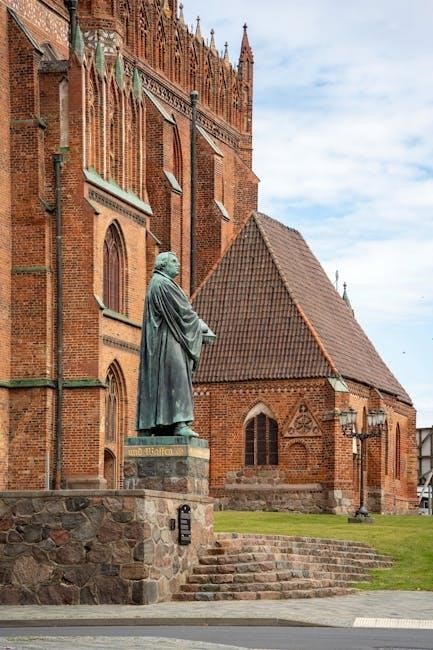Martin Luther’s 95 Theses, published in 1517, criticized Catholic Church practices, sparking the Protestant Reformation. This document questioned indulgences, challenging Church authority and influencing Christian theology profoundly.
Overview of Martin Luther’s 95 Theses
Martin Luther’s 95 Theses, written in 1517, were a list of propositions criticizing the Catholic Church’s practice of selling indulgences. Posted on the door of the Wittenberg Castle Church, this document sparked widespread debate and marked the beginning of the Protestant Reformation. The theses, written in Latin, were titled Disputation on the Power and Efficacy of Indulgences. Luther argued that true repentance required inner faith, not monetary payments, challenging the Church’s authority. The document quickly spread across Europe, inspiring reform and reshaping Christian theology. Its central theme was the misuse of indulgences, which Luther saw as corrupt and contrary to biblical teachings. This bold act remains a pivotal moment in religious and historical transformation.
Historical Significance of the 95 Theses
The 95 Theses hold profound historical significance as the catalyst for the Protestant Reformation. By challenging the Catholic Church’s authority, particularly regarding indulgences, Martin Luther’s document ignited a theological and social movement across Europe. The theses questioned the Church’s power to forgive sins through payments, advocating instead for faith and grace. This critique led to the emergence of Protestantism, reshaping Christianity and influencing Western society. The document’s dissemination via the printing press accelerated its impact, spreading Luther’s ideas widely. It not only sparked religious reforms but also laid the groundwork for individual interpretation of scripture and the priesthood of all believers, fundamentally altering the religious and cultural landscape of the world.

Background of Martin Luther
Martin Luther, born in 1483, was a German theologian and Augustinian monk. He studied theology, became a professor, and advocated for Church reform through his teachings.
Early Life and Education of Martin Luther

Martin Luther was born on November 10, 1483, in Eisleben, Saxony, to Hans and Margarethe Luther. His father, a copper miner, desired a better life for his son and encouraged Luther’s education. At age 13, Luther attended a Latin school in Mansfeld, later enrolling at the University of Erfurt in 1501. He earned a master’s degree in philosophy in 1505 and began studying theology. In 1505, a near-death experience led him to enter the Augustinian monastery in Erfurt, where he was ordained as a priest in 1507. Luther’s intellectual rigor and spiritual struggles shaped his early years, laying the foundation for his later critiques of Church practices and his role in the Reformation.
Luther’s Role in the Protestant Reformation
Martin Luther emerged as a central figure in the Protestant Reformation, challenging Catholic Church doctrines and practices. His 95 Theses, nailed to the Wittenberg church door in 1517, critiqued indulgences and sparked widespread debate. Luther’s assertion that salvation came through faith alone, not Church-mediated rituals, resonated across Europe. His refusal to recant at the Diet of Worms in 1521 solidified his stance, leading to his excommunication. Luther’s translations of the Bible into German made Scripture accessible to laypeople, undermining Church authority. His leadership and writings galvanized reform movements, shaping Protestant theology and inspiring others to challenge Catholic traditions, thereby fundamentally altering the religious landscape of Europe. His influence remains profound in Christianity and beyond.

Historical Context of the 95 Theses
Martin Luther’s 95 Theses emerged in 1517 amidst widespread dissatisfaction with Catholic Church practices, particularly the sale of indulgences, in Wittenberg, Germany, sparking the Protestant Reformation and challenging Church authority.
The Catholic Church’s Practice of Indulgences
The Catholic Church’s practice of indulgences was a central issue prompting Martin Luther’s 95 Theses. Indulgences were remissions of temporal punishment for sins, granted by the Church after confession and penance. Initially intended to alleviate suffering in purgatory, the practice became corrupted, with indulgences being sold to raise funds for Church projects, such as the construction of St. Peter’s Basilica. This commercialization led to widespread abuse, as clergy promised forgiveness in exchange for money, undermining genuine repentance. Luther’s critique focused on the Church’s claim that it could grant forgiveness for a price, which he saw as contradicting biblical teachings on grace and faith. His objections to this practice sparked widespread controversy and laid the groundwork for the Protestant Reformation. The abuse of indulgences remains a key theme in Luther’s arguments.
The Spark That Led to the Reformation
The 95 Theses served as the catalyst for the Protestant Reformation, challenging the Catholic Church’s authority and practices. Martin Luther’s bold act of nailing the document to the Wittenberg church door on October 31, 1517, symbolized his defiance against corruption within the Church. The widespread sale of indulgences, which promised forgiveness for sins in exchange for money, was a key issue Luther addressed. This practice, exploited by the Church to fund projects like St. Peter’s Basilica, undermined genuine repentance and faith. Luther’s critique resonated across Europe, fueled by the printing press, leading to debates and the emergence of Protestantism. His stand against Church abuses ignited a theological and social movement, reshaping Christianity and emphasizing justification by faith rather than works or purchases. The 95 Theses became a defining moment in religious history.

The 95 Theses in PDF Format
Martin Luther’s 95 Theses are available in PDF format, originally published in 1517. The document critiques indulgences, sparking the Protestant Reformation. It outlines his theological arguments, providing insights into Church practices and reforms. The PDF version is widely accessible online for historical and scholarly study.
Content and Structure of the 95 Theses Document
The 95 Theses document, written by Martin Luther in 1517, is a Latin text comprising 95 numbered arguments. It critiques the Catholic Church’s practice of selling indulgences, questioning their validity and abuse. The document is structured as a theological disputation, inviting debate on the power of indulgences. Luther argues that true repentance requires inner faith and contrition, not monetary payments. He challenges papal authority, asserting that only God can forgive sins. The theses conclude by emphasizing the importance of grace and faith over indulgences. This document, available in PDF format, remains a foundational text of the Protestant Reformation, offering insights into Luther’s theology and his call for ecclesiastical reform.
Key Points and Arguments Presented
Martin Luther’s 95 Theses critique the Catholic Church’s sale of indulgences, arguing they exploited believers’ fear of purgatory. Luther contended that indulgences had no biblical basis and undermined genuine repentance. He emphasized that true forgiveness comes from God alone, not papal decrees. Luther also questioned the pope’s authority, asserting that only Scripture, not Church tradition, should guide Christian doctrine. He argued that Christ’s sacrifice, not indulgences, offers salvation. The theses called for a return to biblical teachings and challenged the Church’s corruption. These arguments laid the groundwork for the Protestant Reformation, advocating for faith and grace as the path to salvation.

Key Themes and Arguments
The 95 Theses criticized indulgences, challenged papal authority, and emphasized salvation through faith. Luther argued that true repentance comes from the heart, not purchased pardons.

Critique of Indulgences and Their Abuse
Martin Luther’s 95 Theses primarily targeted the Catholic Church’s practice of selling indulgences, which he viewed as corrupt and theologically flawed. Luther argued that indulgences, promoted as a means to reduce punishment for sins, misled believers into thinking they could buy salvation. He emphasized that true repentance and forgiveness come directly from God, not through monetary transactions. Luther criticized the Church for exploiting people’s fear of purgatory, turning indulgences into a lucrative business. His critique extended to the hierarchy, questioning the pope’s authority to grant such pardons. Luther’s objections sparked widespread debate, challenging the Church’s power and paving the way for reform. His arguments highlighted the ethical and theological abuses surrounding indulgences, calling for a return to biblical teachings on grace and redemption.

The Doctrine of Justification by Faith

Martin Luther’s 95 Theses laid the groundwork for the doctrine of justification by faith, a cornerstone of Protestant theology. Luther argued that salvation comes through faith in God’s grace alone, not through works or indulgences. He rejected the Catholic Church’s emphasis on sacraments and good deeds as means to earn salvation, asserting that Christ’s sacrifice was sufficient for redemption. Luther’s teachings emphasized the believer’s direct relationship with God, unmediated by the Church. This doctrine became central to the Protestant Reformation, challenging traditional Catholic practices and inspiring a movement toward a more personal, faith-centered Christianity. His ideas transformed theological understanding, shaping modern Christian thought and practice.
The Authority of the Pope and the Church
Martin Luther’s 95 Theses challenged the authority of the Pope and the Catholic Church, arguing that the Church’s power was not absolute. Luther rejected the idea that the Pope could forgive sins through indulgences, asserting that only God could grant such forgiveness. He questioned the Church’s hierarchy and its claim to mediate salvation, emphasizing that scripture, not papal decrees, should guide Christian belief. Luther’s critique extended to the Church’s corruption and abuse of power, advocating for a return to biblical teachings. His rejection of the Pope’s authority was a radical departure from Catholic doctrine, fostering the Protestant Reformation and the concept of individual interpretation of scripture. This challenge reshaped Christianity, fostering a movement away from centralized Church control and toward personal faith and biblical authority.

Impact and Legacy
Martin Luther’s 95 Theses profoundly shaped Christianity, sparking the Protestant Reformation, and inspiring widespread religious and social change across Europe, leaving a lasting legacy on Christian theology and freedom.
The Spread of the 95 Theses Across Europe
Martin Luther’s 95 Theses spread rapidly across Europe, facilitated by the printing press. Initially nailed to the Wittenberg church door, the document was soon translated into German and other languages, reaching a broad audience. Its critique of indulgences resonated with many, sparking widespread debate. The theses were distributed in pamphlets, fostering a sense of unity among reform-minded individuals. This dissemination not only challenged Catholic Church authority but also galvanized the Protestant Reformation, inspiring theological and social changes. The swift circulation of Luther’s ideas demonstrated the power of print in spreading revolutionary concepts, forever altering the religious and cultural landscape of Europe.
The Role of the 95 Theses in Shaping Protestantism
The 95 Theses played a pivotal role in shaping Protestantism by challenging key Catholic doctrines, particularly the sale of indulgences. Luther’s arguments, emphasizing faith over works and questioning papal authority, laid the groundwork for Protestant theology. The document’s emphasis on individual interpretation of Scripture and direct relationship with God inspired reformers across Europe. It fostered a movement that sought to return Christianity to its biblical roots, rejecting hierarchical and sacramental traditions. The theses also united dissenters, creating a shared identity among early Protestants. By sparking this theological shift, the 95 Theses became a cornerstone of Protestantism, influencing its development and legacy for centuries to come.
The Document’s Enduring Influence on Christianity
Martin Luther’s 95 Theses left an indelible mark on Christianity, reshaping its theological and cultural landscape. By challenging the sale of indulgences and emphasizing justification by faith, the document inspired a broader critique of Church practices. It fostered a shift toward individual interpretation of Scripture and a more personal relationship with God. The theses also spurred the development of Protestant denominations, decentralizing religious authority and promoting congregational autonomy. Beyond Protestantism, the document influenced Catholic reforms and ecumenical dialogue. Its emphasis on spiritual freedom and biblical authority continues to resonate, making it a cornerstone of Christian thought. Today, the 95 Theses remain a powerful symbol of theological reform and a testament to the enduring quest for spiritual truth.
Martin Luther’s 95 Theses remain a pivotal document in Christian history, sparking the Protestant Reformation and shaping modern theology with its enduring call for spiritual and ecclesiastical renewal.
Final Thoughts on the Importance of the 95 Theses
Martin Luther’s 95 Theses are a cornerstone of Christian history, igniting the Protestant Reformation and challenging Church authority. Their critique of indulgences and emphasis on justification by faith reshaped theology, promoting individual interpretation of Scripture and church reform. The document’s enduring influence underscores its significance in shaping modern Christianity, ensuring its legacy as a foundational text for religious freedom and spiritual renewal. Its impact continues to resonate, making it a vital study for understanding the evolution of Christian thought and practice.
